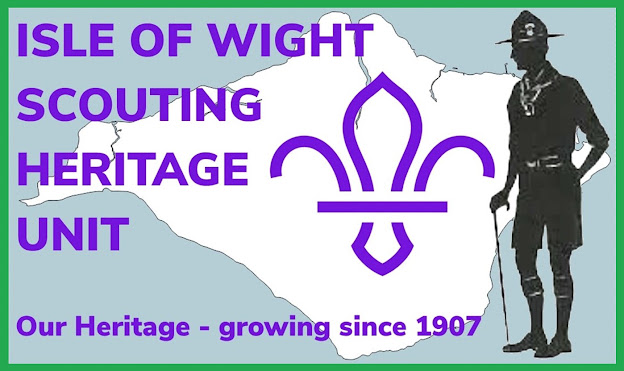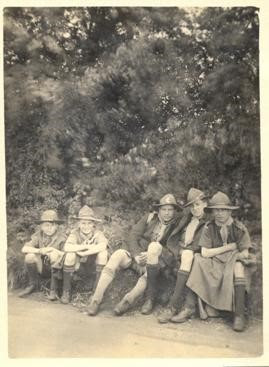Visiting Scout Troops
Hidden in the archives I've come across a number of documents and photos relating to mainland groups coming to visit the Isle of Wight. To start off here's a report from the 1920s which certainly made me think!
Extract from: A Brief Social History of the 1st Abbots Langley 3rd North Watford Scout Group (Formerly the 44th S.W. Herts)
Picture: the original 1st Worcester Park, taken in the early 1920's, we believe at a camp on the Isle of Wight. Many of these boys would have been conscripted to serve in the armed forces in WW2, some never to return.
Bill Johnson recollects some early memories in the 50th Woodsmoke. May 1962
I was half of a long partnership, Basil Funnel and Bill Johnson, were in a sense synonymous terms. We were known as "Jonfun" and one was not without the other.
Basil introduced me to the Troop early in 1929 - he had already had about 18 months in ahead of me. I seem to remember being enrolled at a Hyde Farm Camp in the early summer - I believe I was the first round a camp fire.
I remember the "Chocolate Machine" through which all rookies passed and the many meetings we held in the Wesleyan Church Hall. The tenderfoot tests in Mac's parents house, the wild games in the woods and fields which no longer exist. Names like Black Baldwin, Spot Chalkey, Obber Cox, Alf (alias Stinks Sewer) Newton.
I remember the first Isle of Wight camp where Jonfun first established itself as a runner up to Spot and Obber in the camp cooking stakes. A walk up through the island where at Godshill we got 35 cups of tea from one pot and a very surprised cafe owner.
I remember the next year's camp at Bossington when one of our number lost his footing and broke his arm. The previous year too when he had a boil on his stomach which burst at a most unfortunate moment.
These years passed so very happily. The training, the second Isle of Wight camp and what should have been the third when Alan Macdonald went on ahead and met his death in a motorcycle accident.
This tragedy hit us all very very badly and Scouting in Abbots Langley suffered a reverse from which it very nearly didn't recover. But Alan had laid such foundations that it had to go on.


